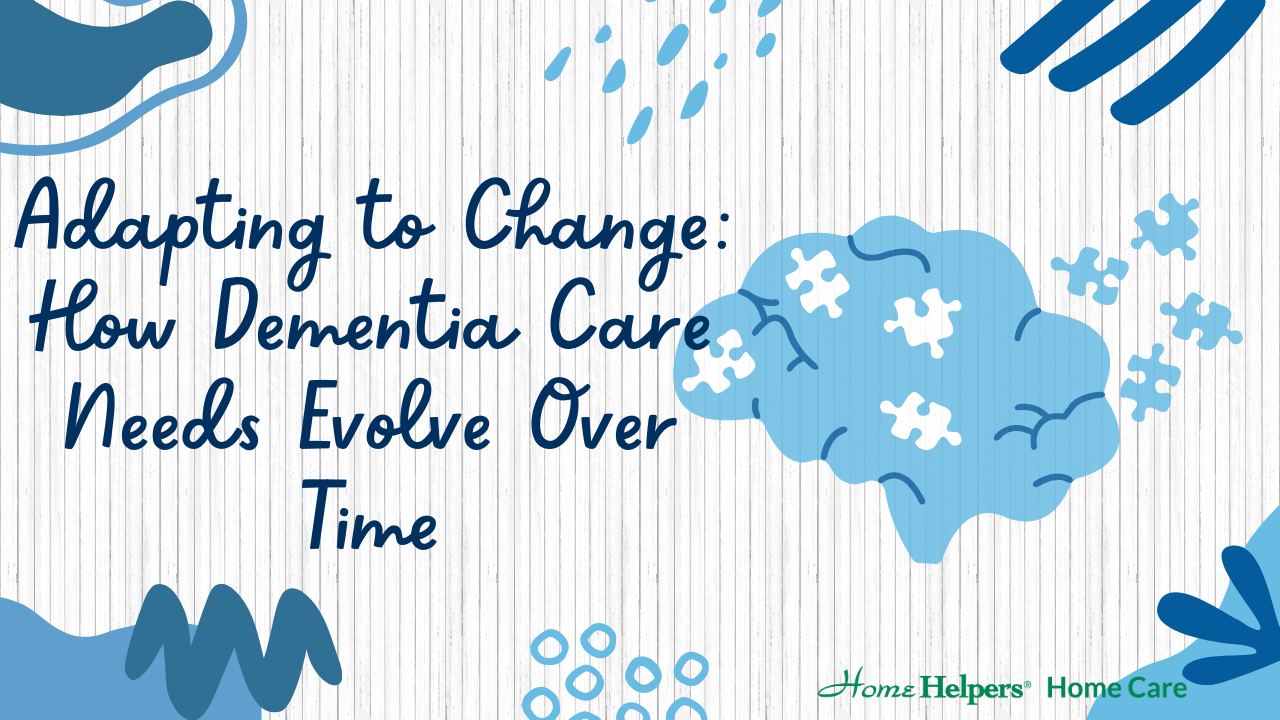Adapting to Change: How Dementia Care Needs Evolve Over Time

Author: Home Helpers Martinsburg
Caring for someone with dementia is never static. It’s a fluid, ever-changing journey that requires families to continually adapt. From initial confusion to full-time care, dementia progresses in stages that often outpace a caregiver’s expectations. Understanding how care needs evolve allows families to respond with compassion, proactive solutions, and the right support at every stage.
The Progression of Dementia: A Quick Overview
Dementia is a progressive neurodegenerative condition, which means symptoms worsen over time. While no two individuals experience it the same way, most follow a general path:
- Early Stage: Mild memory issues, personality shifts, and disorganization.
- Middle Stage: Increased confusion, wandering, difficulty with daily tasks.
- Late Stage: Severe memory loss, immobility, and full dependence on others.
These shifts impact not only the individual but the entire family, often requiring increasing levels of care and emotional support.
Adapting the Environment
In the early stages, care may focus on organization and reminders—labeling cabinets, setting alarms, and streamlining routines. As dementia progresses, home environments need to adapt:
- Remove tripping hazards
- Install door alarms and night lights
- Ensure safe access to bathrooms and kitchens
According to the National Institute on Aging, modifying the home early helps prevent injuries and supports independence longer (NIA, 2022).
Evolving Daily Routines
Routine provides comfort, but as dementia advances, routines need flexibility. What once worked—such as preparing a favorite breakfast—may no longer be safe or feasible. Caregivers must learn to read behavioral cues, adjust activity levels, and respond to mood swings with patience.
This shift often requires specialized caregiving techniques such as redirection, validation, and tactile reassurance. Professional caregivers trained in dementia support can ease this transition significantly.
When Occasional Help Becomes Daily Need
Families often begin with part-time help—companionship, meal prep, or medication reminders. But as dementia progresses, daily care often becomes necessary:
- Assistance with bathing, dressing, and toileting
- Managing incontinence
- Monitoring for fall risks or wandering
- Offering emotional support through difficult behaviors
Bringing in home care earlier in the process helps families avoid crisis-mode decision-making later.
Supporting the Emotional Journey
Caregivers are not immune to the emotional toll of watching a loved one change before their eyes. Guilt, grief, and burnout are common. As care needs grow, caregivers must evolve, too—by asking for help, finding respite, and connecting with resources.
According to the Alzheimer’s Association, caregiver burnout is one of the most common reasons families ultimately turn to professional care (Alzheimer’s Association, 2024).
Creating a Flexible Care Plan
The best care plans evolve with the person’s condition. A proactive plan includes:
- Reevaluating needs monthly or quarterly
- Preparing for transitions to higher levels of care
- Looping in professionals: doctors, social workers, care agencies
- Budgeting for long-term in-home care or memory care programs
Flexibility is the secret to maintaining peace of mind while offering dignity through all stages of dementia.
Final Thoughts
The only constant in dementia care is change. Recognizing that needs will evolve allows families to stay ahead of the curve rather than constantly reacting. Home Helpers Home Care of Martinsburg partners with families to navigate these transitions with compassionate, professional support.
If your loved one’s needs are changing, call us at (304) 433-8000 or visit Home Helpers Home Care of Martinsburg to schedule a no-cost care assessment.
References
- Alzheimer’s Association. (2024). Caregiver Stress and Burnout. https://www.alz.org/help-support/caregiving/caregiver-health
- National Institute on Aging. (2022). Home Safety for People with Alzheimer's Disease. https://www.nia.nih.gov/health/home-safety-and-alzheimers-disease
- Mayo Clinic. (2023). Dementia Caregiving: Tips and Support. https://www.mayoclinic.org/healthy-lifestyle/caregivers/in-depth/caregiver-tips/art-20046787
